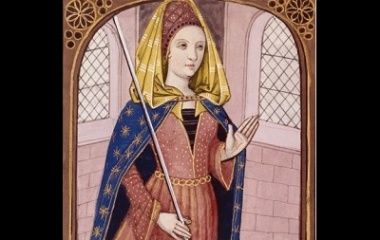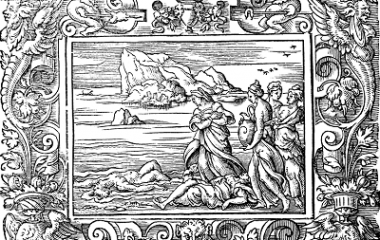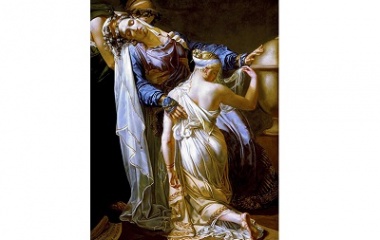- Pronunciation: Hek-yoo-buh
- Other Names: Hecabe
- Origin: Greek
- Location: Troy
- Role: Hero, queen
- Spouse: Priam
- Parents: Speculative
- Children: Many, including Antiphus, Cassandra, Creusa, Deiphobus, Hector and Helenus
Who Is Hecuba?
Hecuba was the queen of Troy in the period of the Trojan War, whose story is chronicled in the Iliad and other classical works of literature. In addition to being a queen, she was also a prophetess who would reveal several bad omens of future events involving the fall of Troy.
Origin
The exact origin of Hecuba is not known. There are some who say that King Dymas, ruler of Phrygia, was Hecuba’s father, with the Naiad Euagora being her mother. Some accounts tell that she was the daughter of King Cisseus of Thrace, and others list Sangarius, one of the river gods, and the river nymph Metope as her parents. There are other accounts still with varying combinations. So, her father was Cisseus, Dymas, Sangarius, or Xanthus, and her mother was Euagora, Eunoe (a nymph), Glaucippe, Metope, or Telecleia. The question of her parentage, and the combination of mother and father, is an open and very varied one. This was such a contentious subject that Tiberius was rumored to have flustered his scholars with questions regarding Hecuba’s parentage.
Family
Hecuba was married to King Priam, becoming his second wife. Together they had 19 children, with some of the more well-known being Cassandra, Hector, Paris, and Polydorus. Some of Hecuba’s children would die at the hands of others, either through battle or through treachery.
History
The story of Hecuba takes place before, during, and after the Trojan War, and includes a number of battles and encounters with the gods.
Omens of Destruction
Hecuba’s pregnancy with Paris would prove to be a restless one and reached a climax with the advent of a prophetic dream. In this dream, rather than giving birth to a normal baby, she brought forth a fiery torch covered in snakes. She sought out the prophets of Troy to interpret this dream, and they revealed that it was a troubling omen. The omen predicted that if her child lived, he would be responsible for the fall and destruction of Troy. Hecuba could not bear this news and as Paris was being born, she ordered two of her servants to kill him. The servants were unable to murder a helpless baby, however, and instead left Paris on the side of a mountain to be taken by wild beasts. But a shepherd soon found Paris and raised him as his own son. Many years later, Paris returned to Troy and began the Trojan War by stealing Helen, wife of King Menelaus, from Sparta. Since all the rulers of Greece had sworn to defend Helen, they declared war on Troy, sacking and burning the city and thus fulfilling the prophecy in a siege of ruin and flame.
Hector’s Doom
Hecuba’s involvement in the Trojan War included advice from her son Hector when he returned to the city. She offered the libation cup to him, urging him to make an offering to Zeus and also to drink from it himself. Hector went on to advise his mother to make a deal with Athena, in which she would offer a gown from Alexander’s treasure to the goddess in exchange for help. The gown in question was beautifully embellished with embroidery, glittering like a star whenever it caught even a hint of light. The gown had been brought back from Sidon when Alexander sailed the seas and was the work of Sidonian women. But Hecuba’s efforts went unanswered. In one final attempt, Hecuba pleaded with Hector not to confront Achilles, but he would not hear of it. That evening, Hector dueled with Achilles, and met his death. When Hecuba later heard of Priam’s plan to retrieve Hector’s body from Achilles’ camp, she became anxious at the thought of losing both a husband and a son in the same day. Hecuba lamented Hector’s death in a great speech, for he was the dearest of all her children.
Apollo and Troilus
Hecuba would later have a child with Apollo, and another prophecy was made: if Troilus were to live until he was 20 years of age, Troy would not fall, despite the previous prophesy. But Achilles waited in ambush while Troilus was riding his horse near a well at the front of the city. Troilus fled to the temple of Apollo, and was slain at the altar and then dragged by his own horses, sealing the fate of the city to doom and ruin in fulfillment of the omen.
Slavery to Odysseus
As if she had not been through enough trials already, Hecuba would be taken prisoner by, and then become a slave to, Odysseus. Before the Trojan War, Odysseus had journeyed through Thrace, where Hecuba had asked its ruler, King Polymestor, to protect her son Polydorus. When the Greeks reached the Thracian Chersonese on their way home, Hecuba discovered that Polymestor had betrayed her trust and killed Polydorus. When she saw her son lying there lifeless, she went mad and, in a fit of rage, tore out Polymestor’s eyes and killed his sons. As Odysseus tried to stop her, she was transformed into a dog by the gods so that she could escape. She was never seen again, until her death when she threw herself into the sea. Her tomb could be found on a rocky outcrop, the Hellespont between Greece and Turkey, and would become an important landmark for sailors.
Current Influence
Hecuba’s tale is mentioned several times in the Iliad, as well as in the Aeneid. She is also the subject of, or a character in, several plays, such as “Hecuba”, and the third in a series of tragedies about the Trojan War, “The Trojan Women,” by Euripides. In later ages, she appears in romantic literature, such as William Shakespeare’s “Hamlet.”










